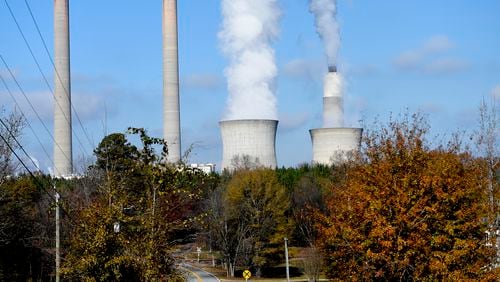ATLANTA (AP) — Georgia Power Co. got the go-ahead Tuesday to build and buy more electrical generation from the Georgia Public Service Commission, despite questions from environmentalists about the demand forecast driving the move and who say it's unwise to let the company burn more fossil fuels.
Four of the Republican commissioners voted to approve the plan put forward by the largest unit of Atlanta-based Southern Co., while Republican Bubba McDonald abstained.
Georgia Power pledges the deal will put downward pressure on rates for existing customers.
Under an agreement negotiated between the utility and commission staff, the company pledges it will credit $615 million a year in revenue toward future rate calculations in 2029 and later, even if all the new customers the company forecasts do not sign up. Georgia Power says that if nothing else changes, that amount of money could cut rates by 1.6%, or $2.89 a month, for a typical residential customer. However, the company is not guaranteeing rates will fall, because other spending could be approved in the meantime.
No rates would change as a result of the deal until 2026.
“Approval of this agreement will preserve and protect the reliability and quality of electric service our customers expect and supports the continued economic development of our state — all while placing downward pressure on rates for all customers,” Georgia Power Chief Financial Officer Aaron Abramowitz said in a statement.
Georgia Power customers have seen their bills rise sharply in recent years because of higher natural gas costs, the cost of construction projects, including two new nuclear reactors at Plant Vogtle near Augusta, and other factors. A typical Georgia Power residential customer now pays about $157 a month, including taxes.
“Our ratepayers cannot continue to see rate hikes,” said Commissioner Fitz Johnson after the vote. “That message needs to go back loud and clear.”
McDonald said he abstained because he feared that if President Joe Biden was reelected, new fossil fuel units could face obstacles. McDonald also questioned the plan during earlier hearings because Georgia Power has not guaranteed there would be no rate increase.
Environmentalists and customer advocates questioned letting Georgia Power buy power and build new fossil fuel plants without going through a competitive process. Using those sources would mean Georgia Power emits more climate-altering carbon dioxide than using solar generation, other renewable sources and conservation.
The request for more generation capacity is unusual because Georgia regulators usually consider those needs on a three-year cycle, with the next integrated resource plan scheduled for next year. But the company says so many new users, including computer data centers, are seeking power that it needs more generation immediately. Company officials said in testimony that 6,200 megawatts of additional demand have signed up in recent years. That's almost three times the capacity of the two new Vogtle reactors.
The deal lets Georgia Power contract for generation from a natural gas plant in Pace, Florida, and from Mississippi Power Co., a Southern Co. corporate sibling. Georgia Power would also be approved to build three new combustion turbines at Plant Yates near Newnan that could burn natural gas or oil. However, the company agreed it wouldn't charge for cost overruns for the turbines unless overruns are caused by factors outside the company's “reasonable control.”
Opponents said the new capacity at Yates shouldn't have been approved, saying cheaper, cleaner sources could have been secured through a competitive process.
“It was well-established in by multiple witnesses in the record that the decision on those units can wait,” Bryan Jacob of the Southern Alliance for Clean Energy told commissioners last week.






